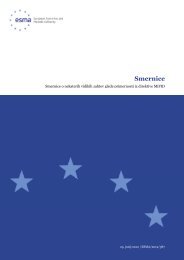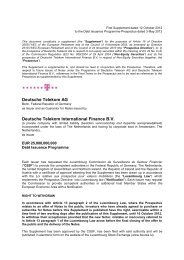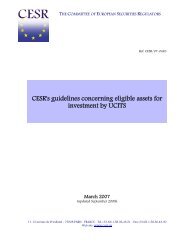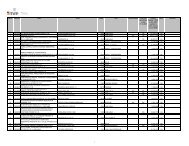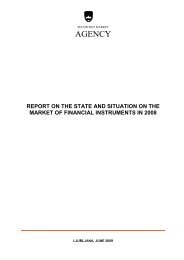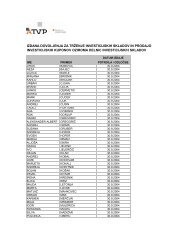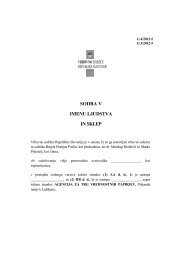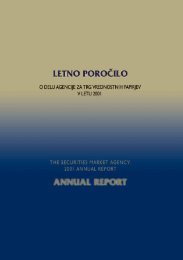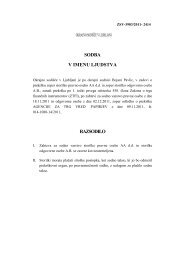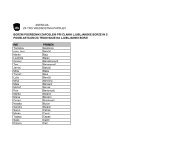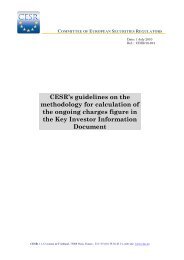minimum transfer bandwidth of 1 Mbit/s also count toward meeting the requirements. Irrespective ofthis, each network operator must provide 50% of the population with 800 MHz broadband services bythe start of 2016. On 21 December and 28 September 2011, the Federal Network Agency gave noticethat the requirements to deploy LTE associated with Deutsche Telekom's license had already beenfulfilled in seven of Germany's federal states. Since then, the allocated 800 MHz frequency spectrumhas also been available for use outside of rural regions in these seven federal states. There were norestrictions on Deutsche Telekom's license for three additional federal states.There are also roll-out requirements for the new frequencies in the 1.8 GHz and 2.6 GHz spectrumranges: 25% population coverage by the beginning of 2014 and 50% by the beginning of 2016. AsGSM and UMTS also count toward these coverage targets, Telekom Deutschland GmbH has alreadymet these requirements.United StatesDeutsche Telekom's U.S. mobile operations, conducted through T-Mobile USA, are regulated by theFCC and by various other federal, state and local governmental bodies. Only the FCC has authority toregulate "rates and entry" by Commercial Mobile Radio Service ("CMRS") operators, while both theindividual states of the United States and the FCC have authority to regulate "other terms andconditions" of CMRS. The FCC has refrained from regulating rates charged by CMRS operators.However, under its authority to license CMRS operators to serve the public, the FCC has imposed anumber of requirements on operators, including, for example, rules for providing emergency 911services, number portability, support for lawful electronic surveillance, and intercarrier compensation(payment of access charges for carrying and terminating traffic). In addition, the FCC issues andregulates CMRS spectrum licenses. Spectrum related to the Advanced Wireless <strong>Services</strong> (AWS-1)licenses granted in 2006 was occupied by incumbent commercial providers on the 2.1GHz band andFederal government agencies on the 1.7 GHz band. The 2.1 GHz incumbents relocation rules aregoverned by FCC regulation, whereas the 1.7 GHz incumbents relocation process is governed by theCommercial Spectrum Enhancement Act. Access to the spectrum is tied to moving these entities awayfrom using these spectrum bands, and has largely been accomplished at this point.Other current U.S. regulatory issues that may significantly impact T-Mobile USA's business include:• Open Access/Network Neutrality: The FCC has initiated several proceedings that propose theadoption of regulations to require wireless providers (and other telecommunications carriers) to"open" their networks to applications, devices, and services provided by third parties. These variousproceedings involve a variety of issues, including text messaging practices, network provisioning,handset locking, exclusive arrangements with handset manufacturers, and the extent to whichcarriers may deny access to devices and applications based on their need to manage theirnetworks. In December 2010, the FCC adopted a Report and Order imposing net neutralityobligations on broadband service providers, including mobile carriers. Of significance to T-MobileUSA, the Report and Order establishes two new rules for mobile broadband providers.• Transparency: Mobile broadband Internet providers must publicly disclose accurate informationabout their services, including network management practices and network, performance, andcommercial terms to consumers; Internet content and service providers; applications developers;and device manufacturers.• No Blocking: Mobile broadband providers must not block access to lawful websites orapplications that compete with voice or video services offered by the provider. The ban onblocking is subject to exceptions for actions that constitute "reasonable network management",including efforts to address network congestion and ensure network security.• While not prohibiting "pay-for-priority" agreements outright, the order finds such arrangementsunlikely to satisfy the unreasonable discrimination ban. Broadband Internet access providers maycontinue to offer "tiered" pricing based on amount of data usage and/or speed, but the FCC willmonitor these practices. Similarly, the FCC has also indicated it will monitor the consumer impact of"specialised services" offered by broadband providers over their last-mile networks (such asfacilities-based VoIP or IPTV) even though such services are not currently subject to the networkneutrality rules. The FCC notes that it includes in its definition of broadband Internet access serviceany service that is "used to evade the protections" of the net neutrality rules in an effort to preventISPs from using limited or specialised services to avoid the new rules. Thus, if the FCC determinesthat a mobile provider is offering a broadband Internet service to evade the protections of the rules60
(e.g., avoid disclosure or blocking prohibitions), the FCC will closely scrutinise the offering and mayultimately revise its rules or take some other action to address the issue.• The new rules were published in September 2011 and became effective on 20 November 2011,although the rules face further opposition in Congress and in the courts. Many congressionalmembers have expressed their opposition to the new rules, and Verizon and MetroPCS have filed alawsuit in federal court asking the court to overturn them. This lawsuit is pending.• Data Roaming: In 2007, the FCC adopted an automatic roaming mandate for voice services, and in2010 it eliminated the "home-market exclusion", which had excluded from the mandate allgeographic areas in which a carrier requesting automatic roaming held spectrum licenses even if thecarrier had no facilities in those areas. On 7 April 2011, the FCC adopted an Order requiringfacilities-based CMRS providers to offer data roaming arrangements on commercially reasonableterms and conditions. As the volume of traffic is increasingly shifting from voice to data use, a dataroaming obligation has become more significant to T-Mobile USA. Without an FCC-mandatedroaming obligation, larger carriers would not be required to provide roaming service or may elect todo so on unreasonable terms and conditions. The two largest carriers – AT&T and Verizon –aggressively opposed a data roaming requirement, and Verizon has filed a lawsuit in federal courtseeking to overturn the requirement. T-Mobile USA along with several other wireless carriers hasintervened in the court proceeding in support of the FCC. It is unclear whether Verizon will prevail inits efforts to overturn the FCC's decision requiring data roaming on commercially reasonable termsand conditions.• Tower Siting: At the beginning of January 2012, the FCC released an order to ensure that theenvironmental effects of proposed communications towers, including their effects on migratory birds,are fully considered prior to construction. The effect of this order will be that carriers will have tobuild additional time into the siting timeline for new or modified towers requiring a new AntennaStructure Registration number (ASR) or a modified ASR. Deutsche Telekom expects that the currentone or two-day timeframe to obtain an ASR will be expanded to potentially 60 days or more becauseDeutsche Telekom anticipates the requirement to result in substantial internal coordination within T-Mobile markets and regions and legal and regulatory departments.• Universal Service: In November 2011, the FCC adopted an order that comprehensively reforms andmodernises the Universal Service Fund (USF), transforming it from a fund for legacy voice networksinto two new funds, a Connect America Fund (CAF) and a Mobility Fund (MF), whose purpose is tomake broadband available nationwide. The creation of the CAF is primarily for non-wireless carriers,and the MF is primarily for wireless carriers. To fund the CAF and MF, the FCC is eliminating thelegacy USF system and phasing out support to competitive eligible telecommunications carriers,such as T-Mobile, by 20% over each of the next five years. Deutsche Telekom is currentlyconsidering participation in the MF and seeking other opportunities to receive USF support.However, given Deutsche Telekom's current level of USF support, Deutsche Telekom will beadversely affected by the elimination of this subsidy.• The FCC's next step in USF reform is expected to focus on how to revamp the revenues-based USFcontributions system, a reform which may affect Deutsche Telekom's contribution to USF.Currently, all telecommunications service providers, including Deutsche Telekom, and certain otherproviders of telecommunications must contribute to the current federal USF based on a percentageof their interstate and international end-user telecommunications revenues. The exact percentagethat companies contribute is adjusted every quarter based on projected demand for UniversalService funding. This percentage has reached an all-time high over the last several years. One wayfor the FCC to limit the growth of contributions is to expand the base of contributors to USF. TheFCC has had an open proceeding on this issue for several years and is expected to finally startexamining the issue again this year.61
- Page 1 and 2:
Debt Issuance Programme ProspectusD
- Page 3 and 4:
Responsibility StatementDeutsche Te
- Page 5 and 6:
to form and content, and all rights
- Page 7 and 8:
Maturities:Form of Notes:Fixed Rate
- Page 10 and 11: Summary in respect of Risk FactorsR
- Page 12 and 13: Notes may not be a suitable investm
- Page 14 and 15: Internationalisation and Sustainabi
- Page 16 and 17: German Translation of the SummaryDi
- Page 19 and 20: Besteuerung:Vorzeitige Rückzahlung
- Page 21 and 22: Zusammenfassung der RisikofaktorenZ
- Page 23 and 24: Zusammenfassung der Risikofaktoren
- Page 25 and 26: Unternehmen aus diesem Grund zusamm
- Page 27 and 28: Risk FactorsProspective investors s
- Page 29 and 30: markets. These developments could,
- Page 31 and 32: consumer regulation at the federal
- Page 33 and 34: Existing mobile substitution effect
- Page 35 and 36: exacerbated by the global economic
- Page 37 and 38: are subject to several individual l
- Page 39 and 40: While Deutsche Telekom believes tha
- Page 41 and 42: exposed to the risk of an unfavoura
- Page 43 and 44: principal under such Notes may even
- Page 45 and 46: Statement of cash flows (page 9 in
- Page 47 and 48: otherwise agreed between the Issuer
- Page 49 and 50: DESCRIPTION OF BUSINESSGroup Organi
- Page 51 and 52: In February 2011, T-Mobile Czech Re
- Page 53 and 54: 2010. The demand for ever-faster da
- Page 55 and 56: Special Requirements Applicable to
- Page 57 and 58: Local Loop AccessDeutsche Telekom h
- Page 59: Incumbent network operators are obl
- Page 63 and 64: PTC as Deutsche Telekom clarified t
- Page 65 and 66: combinations of businesses where De
- Page 67 and 68: For more information on the effects
- Page 69 and 70: • Other operating expenses increa
- Page 71 and 72: 345Includes expense relating to a c
- Page 73 and 74: investment levels to remain approxi
- Page 75 and 76: products and technologies, these in
- Page 77 and 78: Reconciliation of Net Debt31 Dec. 2
- Page 79 and 80: Deutsche Telekom's cash outflows fo
- Page 81 and 82: 1In addition to the fixed-network l
- Page 83 and 84: Development of Operations2011 2010
- Page 85 and 86: to upgrade its mobile network, prov
- Page 87 and 88: Czech Republic. Deutsche Telekom ha
- Page 89 and 90: decrease mobile termination rates,
- Page 91 and 92: The decrease in adjusted EBITDA in
- Page 93 and 94: In 2011, the United States operatin
- Page 95 and 96: The increase in total revenue in 20
- Page 97 and 98: solutions. It also manages and deve
- Page 99 and 100: In 2010, T-Systems substantially ex
- Page 101 and 102: 2011 2010 Change ChangeOf which: Vi
- Page 103 and 104: conditions for additional capital m
- Page 105 and 106: For additional information on the c
- Page 107 and 108: Employees in the Group 31 Dec. 2011
- Page 109 and 110: Civil servants employed by Deutsche
- Page 111 and 112:
Selected Financial InformationDeuts
- Page 113 and 114:
(Vorlagebeschluesse) with respect t
- Page 115 and 116:
Court of Justice annulled these jud
- Page 117 and 118:
having to pay license fees and comp
- Page 119 and 120:
Civil ServantsIn November 2004, Ger
- Page 121 and 122:
majority holdings by 2 May 2015, on
- Page 123 and 124:
Group Accounting manages the proces
- Page 125 and 126:
Deutsche Telekom International Fina
- Page 127 and 128:
Statement of comprehensive incometh
- Page 129 and 130:
Terms and ConditionsThis Series of
- Page 131 and 132:
"Global Note" means [the/any] [Temp
- Page 133 and 134:
interest shall continue to accrue o
- Page 135 and 136:
7 February 1992), the Amsterdam Tre
- Page 137 and 138:
Period is a day other than the 30th
- Page 139 and 140:
[in the case of Definitive Notes in
- Page 141 and 142:
([4]) of this § 6.](b)Notice of re
- Page 143 and 144:
of Stock Exchange], a Paying Agent
- Page 145 and 146:
(f)(g)the Issuer [in the case of No
- Page 147 and 148:
§ 14[(5)] to the Agent. Such notic
- Page 149 and 150:
Garantin] noch der Fiscal Agent ode
- Page 151 and 152:
Bei Rückzahlung oder Zahlung einer
- Page 153 and 154:
(b)Fällt ein Zinszahlungstag auf e
- Page 155 and 156:
[Sofern eine andere Methode der Bes
- Page 157 and 158:
[im Falle von Actual/360: die tats
- Page 159 and 160:
Für diese Zwecke bezeichnet "Zahlt
- Page 161 and 162:
Eine solche Kündigung darf allerdi
- Page 163 and 164:
(i)[Referenz-Preis einfügen] (der
- Page 165 and 166:
[(e)(f)von einer Zahlstelle abgezog
- Page 167 and 168:
(b)(c)(d)die Nachfolgeschuldnerin a
- Page 169 and 170:
eine vertretungsberechtigte Person
- Page 171 and 172:
(d)(e)(f)(iii)(iv)(v)(vi)by reason
- Page 173 and 174:
Non-binding translation of the Guar
- Page 175 and 176:
ganz oder teilweise in irgendeiner
- Page 177 and 178:
Tag der Begebung: [ ]These are the
- Page 179 and 180:
CURRENCY, DENOMINATION, FORM AND TI
- Page 181 and 182:
INTEREST (§ 4) 8ZINSEN (§ 4)o Fix
- Page 183 and 184:
oooooo ISDA Determination 9ISDA-Fes
- Page 185 and 186:
Instalment Amount(s)Rate(n) [ ]Earl
- Page 187 and 188:
GOVERNING LAW (§ 14)ANWENDBARES RE
- Page 189 and 190:
German Securities Code [ ]Deutsche
- Page 191 and 192:
Umfassende Erläuterung darüber, w
- Page 193 and 194:
Various categories of potential inv
- Page 195 and 196:
Commissions 29ProvisionenManagement
- Page 197 and 198:
Die Emittentin hat die Informatione
- Page 199 and 200:
Payment of the flat income tax will
- Page 201 and 202:
Kingdom of the Netherlands.Where th
- Page 203 and 204:
ResidentsAccording to the law of 23
- Page 205 and 206:
(c)account or benefit of, U.S. pers
- Page 207 and 208:
4. United KingdomEach Dealer has re
- Page 209 and 210:
Names and AdressesIssuersDeutsche T
- Page 211:
2010 2010PricewaterhouseCoopers Akt



